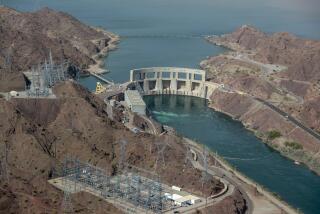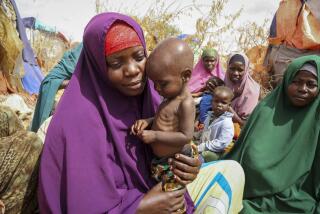United Nations Report Says 1.1 Billion People Lack Safe Water
- Share via
NAIROBI, Kenya — Mismanagement, limited resources and environmental damage have combined to deny 1.1 billion people access to safe water, says a new United Nations report issued Thursday.
Sub-Saharan Africa is one of the hardest-hit areas, where ecological degradation, poor water management and a burgeoning population have led to water shortages, exacerbating poverty, disease and drought, the report says.
The 24 U.N. agencies that compiled the report say it is the most comprehensive assessment of the planet’s freshwater supplies.
Globally, diarrheal diseases and malaria kill an estimated 3.1 million people a year. The U.N. said 1.6 million people could be saved each year if they had safe drinking water, sanitation and hygiene.
The report estimates that hundreds of millions of dollars are lost each year in productivity and healthcare costs because of poor water and sanitation. Reducing by half the number of people without a steady supply of clean water by 2015 -- a U.N. Millennium Development Goal -- would save $7 billion annually, the report says.
Water pollution in China cost the country $1.7 billion in industrial income in 1992, the last year for which figures were available in the report.
Better water management could also save lives in Kenya and elsewhere in East Africa, where drought is causing severe food shortages, the U.N. said.
Water use has increased six-fold in the last century, double the rate of population growth, the report says. More water is needed for food production, which must increase 55% by 2030 to meet need. But private investment in water services is declining, and financial resources for the water sector are stagnating, the report says.
More to Read
Sign up for Essential California
The most important California stories and recommendations in your inbox every morning.
You may occasionally receive promotional content from the Los Angeles Times.













